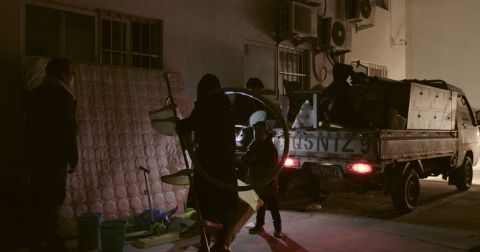Hao Jingban

Hao Jingban, still from Slow Motion (2018). Courtesy of the artist and Blindspot Gallery
Focusing on China’s recent history and its ongoing process of modernization, Hao Jingban’s cinematic work explores the memories and feelings often made opaque and ineffable by a society driven by economic development and structured by depoliticization. In her Beijing Ballroom series (2012–16), for instance, Hao examines the affective consequences of China’s modern revolutions through dancing bodies. By working with archival and artist-made footage, the video work dives into the soft strata of personal experience shaped by continuous political shifts. In her work Slow Motion (2018), Hao captures the forced relocation of migrant workers in Beijing’s outskirts in the winter of 2017, after a fire killed 19 people in an overcrowded apartment block. The municipal authorities thereafter launched a campaign to inspect ‘illegal structures’ while removing ‘low-end population’. This widely criticized operation displaced tens of thousands of low-income workers—many without local household registration—as part of a broader effort to restructure the city through urban ‘clean-up’ measures. Accompanied by American jazz duo and civil rights activists Abbey Lincoln and Max Roach’s song ‘Freedom Day’, the short video merges slowed-down footage of workers loading and discarding personal belongings at night, and the artist’s monologue analyzing slow motion as a typical cinematic language to elaborate and prolong the enjoyment of viewing violence. Employing slow motion as an expression of the brutality of power, Hao seeks to ‘see’ the entrenched inequality in the society in which she resides through the seemingly mundane images.
WORK IN THE EXHIBITION: Slow Motion (2018), 1-channel video, 6' 45". Courtesy of the artist